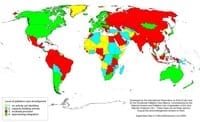Landmark global survey reveals major shortcomings in many countries around the world – Innovation Needed
Governments around the world are leaving hundreds of millions of cancer patients to suffer needlessly because of their failure to ensure adequate access to pain-relieving drugs, an unprecedented new international survey reveals.
The new data, released to the public during the ESMO 2012 Congress of the European Society for Medical Oncology in Vienna, paints a shocking picture of unnecessary pain on a global scale, said Prof Nathan Cherny, lead author of the report from Shaare Zedek Medical Center, Jerusalem, Israel, Chair of the ESMO Palliative Care Working Group.
“Unrelieved cancer pain is a cause of major worldwide suffering, not because we don’t have the tools necessary to relive pain, but because most patients don’t have access to the essential pain-relieving medication,” Prof Cherny said. “This pandemic affects literally billions of people. Not only are the patients suffering often terrible unrelieved pain, but their family members are often permanently scarred by the memories of witnessing such suffering in their loved ones.”
The International Collaborative Project to Evaluate the Availability and Accessibility of Opioids for the Management of Cancer Pain was initiated by the European Society for Medical Oncology and coordinated with the European Association of Palliative Care (EAPC), the Pain and Policies Study Group (PPSG) at the University of Wisconsin Carbone Cancer Center, the Union for International Cancer Control (UICC) and the World Health Organization (WHO). They were assisted by the cooperation and participation of a further 17 international oncology and palliative care organizations[1]. This project was undertaken under the auspices of the ESMO Developing Countries Task Force, led by Dr. Adamos Adamou, Cyprus.
The study data was gathered between December 2010 and July 2012, with 156 reports submitted by experts in 76 countries and 19 Indian states. These reports represented 58% of countries and 83% of 5.7 billion of the people living in Africa, Asia, the Middle East and Latin and Central America and the Caribbean[2].
The researchers found that very few countries provided all seven of the opioid medications that are considered to be essential for the relief of cancer pain by the International Association for Hospice and Palliative Care[3]. Those essential medications include, among others, codeine, immediate and slow release oral morphine, oral oxycodone and transdermal fentanyl.
In many countries, fewer than three of the seven medications are available. In many of the countries, those medications that are available are either unsubsidised or weakly subsidised by government, and availability is often limited. Furthermore, many countries have highly restrictive regulations that limit entitlement of cancer patients to receive prescriptions, limit prescriber privileges, impose restrictive limits on duration of prescription, restrict dispensing, and increase bureaucratic burden of the prescribing and dispensing process.
There is an urgent need to examine drug control policies and repeal excessive restrictions which impede this most fundamental aspect of cancer care, the researchers said. The issues were particularly severe in Africa, Asia, the Middle East and Latin and Central America.
“The study has provided an unprecedented wealth of knowledge that will be an essential tool in lobbying to reformulate national plans for the treatment of cancer pain,” Prof Cherny said. “We now know which countries have suboptimal formularies of medication to relive pain, we know how much patients must pay out-of-pocket for the medications, and we know which countries have excessive regulatory barriers making it sometimes nearly impossible for a patient to get a prescription, get it to a nearby pharmacy and have the medicine dispensed.”
“In many, if not most, of the counties and states we have looked at, patients are stymied by regulatory barriers at multiple steps along this process; the end result being that hundreds of millions patients don’t have access to essential pain-relieving medications,” Prof Cherny said.
via ESMO
The Latest Streaming News: Untreated cancer pain updated minute-by-minute
Bookmark this page and come back often
Latest NEWS
Latest VIDEO











